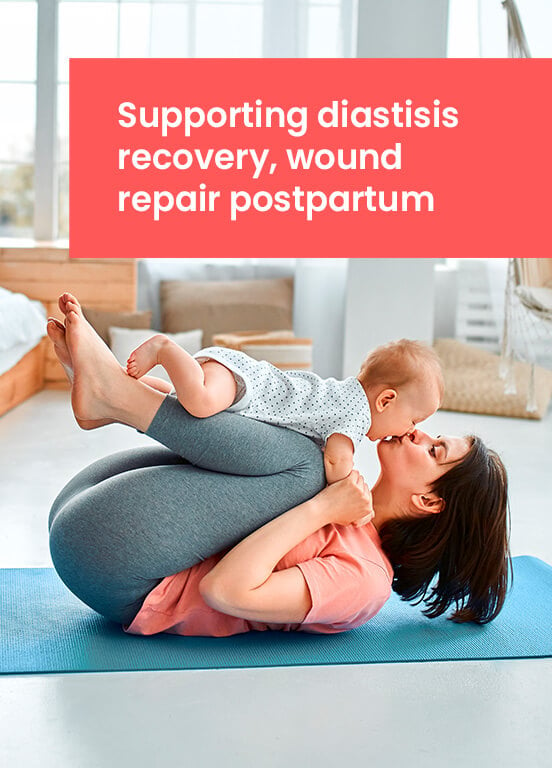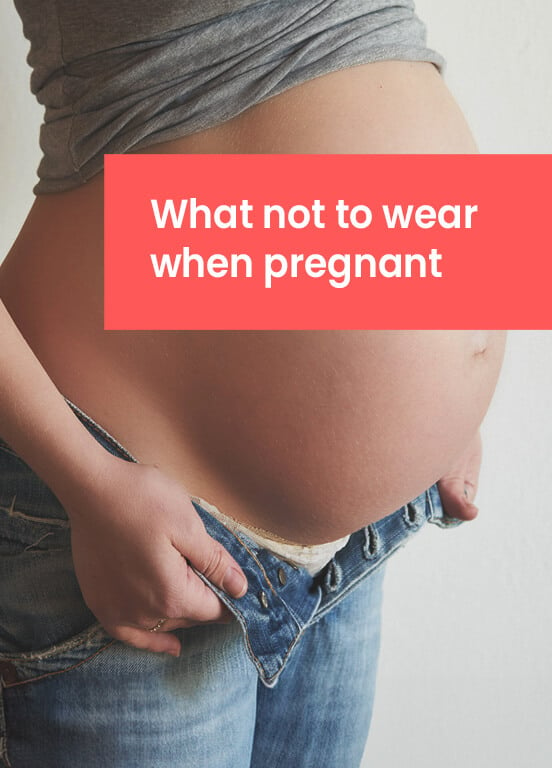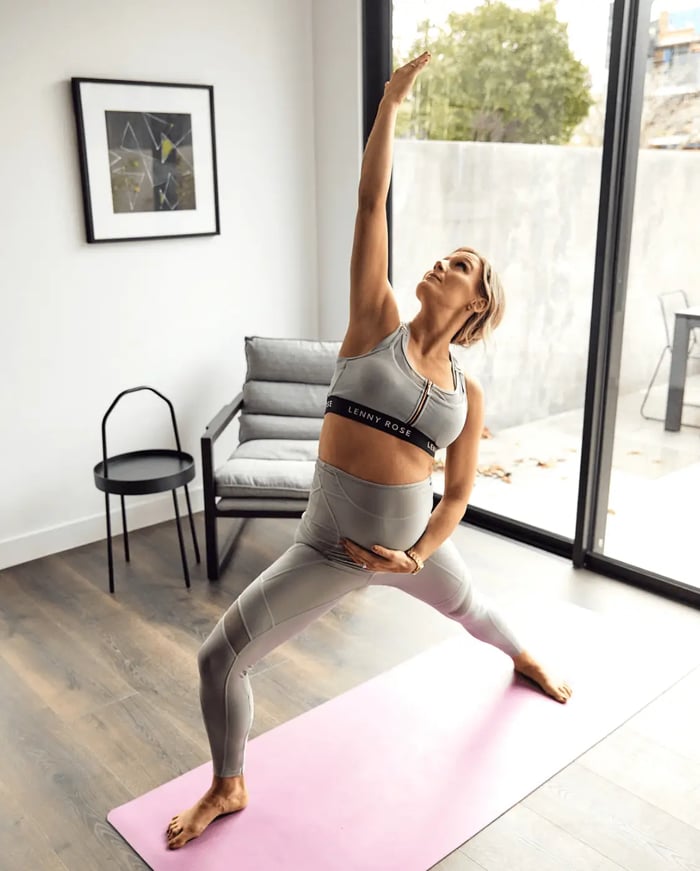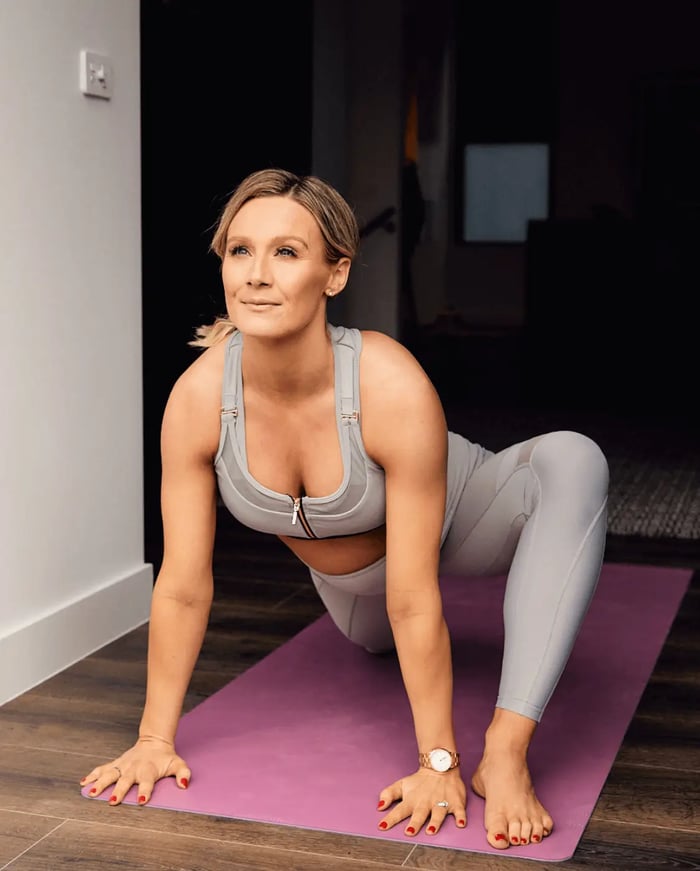Diastasis recti and wound repair are part of the postpartum journey that can be supported by compression. There are some top tips for holistic care for postpartum Diastasis recti and wound repair.
Compression support
Addressing Diastasis Recti:
Diastasis recti, the separation of the abdominal muscles during pregnancy, is a common for up tp 100% of mothers by 30 weeks of pregnancy. Around 60% of diastasis will spontaneously resolve by 6-8 weeks postpartum, for the remaining 40% that do not seek therapy, the problem is ongoing. Everform compression wear is crafted to provide targeted and balanced support to the abdominal area, gently assisting in realigning and supporting the muscles as they naturally heal. Compression garments with appropriate compression ratios create an environment that encourages optimal recovery from diastasis recti.
Enhance Wound Repair:
The postpartum period often involves recovery from episiotomies, C-sections, or other childbirth-related wounds. Compression wear can be instrumental in this healing process. The gentle pressure applied by our garments promotes blood circulation, aiding in efficient wound repair and reducing post-surgery discomfort. Early wear of compression products is well cited in scientific literature to reduce pain, reduce distress, reduce reliance on opioid medication and aid comfortable early mobilsation.
Holistic Recovery Recommendations:
Consult with your Healthcare Professional:
Seek guidance from healthcare providers such as your obstetrician, gynaecologist, midwife or physiotherapist specialising in women's health. They can assess your specific condition and provide tailored recommendations. The standard “6 week check” should be a thorough assessment of your pelvic floor, core, any wounds, continence or other issues, as well as general mobility and comfort. We encourage a women’s health assessment at 6 weeks postpartum for the best steps forward into healthy recovery.
Engage in Diastasis Recti Exercises:
Physiotherapy exercises focused on diastasis recti can help strengthen and realign abdominal muscles. Pelvic tilts, transverse abdominal exercises, and pelvic floor exercises are commonly recommended. However, it's crucial to perform these exercises under professional guidance.
Gradual Return to Exercise:
Gradually reintroduce low-impact exercises, such as walking and gentle yoga, after receiving approval from healthcare professionals. Avoid high-impact activities until your body has sufficiently healed.
Pelvic Floor Physical Therapy:
For women recovering from childbirth-related wounds, pelvic floor physical therapy can be beneficial. This specialised therapy addresses issues like pelvic pain, prolapse or heaviness, incontinence, and supports overall pelvic health. They will be able to guide you on appropriate entry level of exercise, when to commence scar massage, and can assist with weakened, or overactive/tight pelvic floor muscles which are common even post ceasarean section.
Maintain Good Posture:
Pay attention to your posture, especially when lifting or carrying objects. Practice engaging your pelvic floor and core muscles to provide support to the abdominal area.
Nutrition and Hydration:
Ensure a balanced diet rich in nutrients to support your body's healing process. Staying hydrated is also essential for overall health and recovery. We know that tissue remodelling in this area can take up to 2 years, and adequate consumption of protein, calories and a nutrient rich diet is essential for this process.
Scar Care:
If you have scars from a C-section or episiotomy, follow your healthcare provider's recommendations for scar care. This may involve keeping the area clean, applying recommended ointments, and avoiding excessive stretching or pressure on the healing scars. Ice is great in the early days, and can be inserted into the middle layer of a postpartum pad to provide comfort and hygiene.
Pelvic Floor Exercises:
Strengthening the pelvic floor muscles is crucial for postnatal recovery. Kegel exercises or pelvic floor muscle training can be part of a pelvic floor and core exercise but it's essential to perform them correctly. Instruction via your women;s health physiotherapist using real time ultrasound or internal examination are the most effective ways to ensure correct action. Doing pelvic floor exercises laying down is one thing, once you have mastered technique, you will want to incorporate pelvic floor awareness into daily functional movements - like before you lift something, cough, sneeze, squat, and so on.
$159.00
Specifically designed to support healing from perineal wounds, C-section scars, and diastasis recti, while promoting venous return and alleviating back strain. … Read morePOSTPARTUM RECOVERY LEGGING
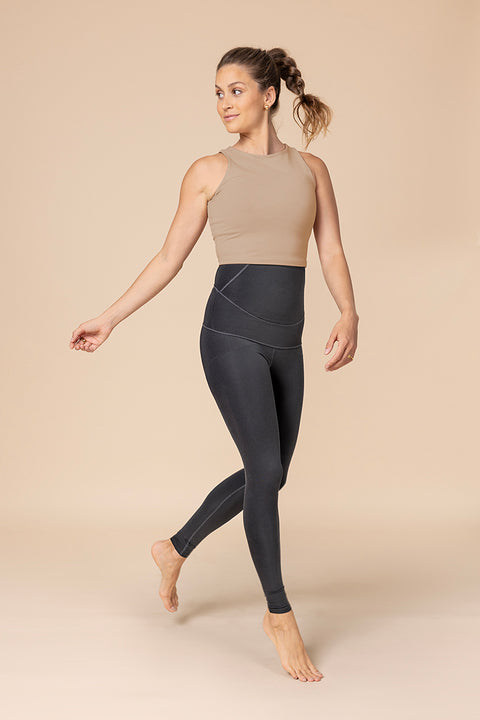
Emotional Well-being:
Postpartum recovery is not only physical but also emotional. Seek emotional support and take time for self-care. Practices such as mindfulness, deep breathing, and adequate rest are crucial for overall well-being.
Providing Stability and Comfort:
Everform compression wear is designed with your comfort in mind. Experience the stability and security offered by garments that gently cradle your body. The compression not only supports weakened abdominal muscles but also provides a comforting layer that eases movement and minimises potential discomfort associated with postpartum recovery, and aids early return to normal movement in a safe way.
Boosting Confidence:
Motherhood is a journey of self-discovery, and regaining confidence in your body postpartum is a crucial aspect of this voyage. Our compression wear not only supports physical recovery but also provides a sense of security, helping you stand tall and embrace the changes with confidence. Because you deserve to feel strong, supported, and beautiful.
Take our quiz to find out the Everform Therapywear suited to your needs
The Everform team are excited to be walking alongside you on the journey and reach out with any questions hello@everformwear.com
